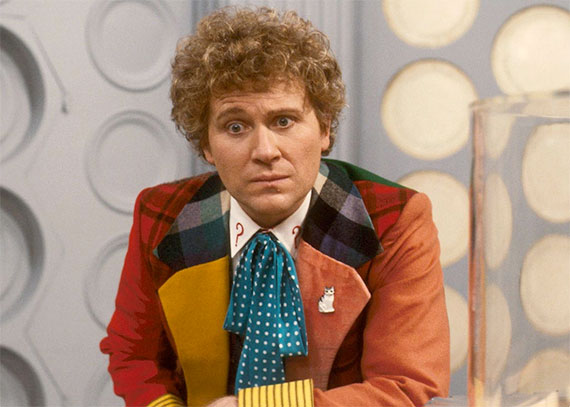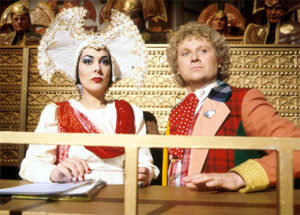Doctor Who In Perspective 1984-1986 (Part 1)
John Hussey continues his Classic Who look back, this time with the Colin Baker era.

“Planets come and go. Stars perish. Matter disperses, coalesces, forms into other patterns, other worlds. Nothing can be eternal.”
Colin Baker (unfortunately) arrived at the wrong time and ended up losing a lot of his potential in playing the legendary Time Lord onscreen. After the charming nature of Peter Davison’s portrayal it quickly became apparent that C. Baker’s darker direction wasn’t to everyone’s taste.
I myself find the tone and ideals of this particular era to be a bold move, one I very much appreciate. The Sixth Doctor was an absolute contrast to the Fifth Doctor, which was needed. The glorious element about regeneration is the ability to transform the show’s protagonist. By making the next incarnation a completely different character allows for greater storytelling and a massive test for us fans. ‘The Twin Dilemma’ (the last serial of Season Twenty-One) went about to create a dislikeable Doctor through his regeneration failing and causing him to act out-of-character. These actions were demonstrated through the horrific imagery of the Sixth Doctor strangling Peri (after accusing her of treachery) and transitioning between emotions with him one minute presented as a concerned hero and the next a coward filled with self-interest.
I’d argue with the accusation of the Sixth Doctor being too aggressive and disconcerting because this was what the First Doctor was like before he mellowed out (courtesy of Ian Chesterton and Barbara Wright). Also the Sixth Doctor suffered greatly from post-regenerative trauma, more so than any previous incarnation. This was the underlining thread of his first full season to which the Sixth Doctor referenced in serial four (‘The Two Doctors’). It took his Doctor roughly five serials or more to find his footing, which was another great element to his incarnation because it led us to invest in him more in order to see what he would become. As shown in ‘The Trial of a Time Lord’ his character grew over time and became a gentle soul who cared for those around him and fought to stop those who tried to cause harm or corrupt.
 The Sixth Doctor was very self-opinionated, enjoying prancing around and declaring how wonderful he was in any given situation. This irritated Peri Brown a lot throughout their earlier adventures together (for good reasoning). I would say this was the worst characteristic the Sixth Doctor donned because it made him quite full of himself, like he was self-in-love. One thing I did enjoy about the Sixth Doctor was his ability to speak his mind without fear of what those around him thought. Because of this he could be abrupt and straight to the point.
The Sixth Doctor was very self-opinionated, enjoying prancing around and declaring how wonderful he was in any given situation. This irritated Peri Brown a lot throughout their earlier adventures together (for good reasoning). I would say this was the worst characteristic the Sixth Doctor donned because it made him quite full of himself, like he was self-in-love. One thing I did enjoy about the Sixth Doctor was his ability to speak his mind without fear of what those around him thought. Because of this he could be abrupt and straight to the point.
A love/hate element to his early era was the constant bickering between him and Peri which could be fun to watch one moment and annoying the next. It was certainly a contrast to the relationship Peri had with the Fifth Doctor which in essence stirred things up, making her seem a little unsafe (especially during ‘The Twin Dilemma’). By ‘The Trial of a Time Lord’, however, their relationship became rather close and the bickering was replaced by mutual respect and a caring understanding to one another.
One of the Sixth Doctor’s greatest characteristics was his Shakespearian portrayal. He would often be rather artistic, loud in his approach whilst enjoying metaphors and re-writing good quotes. He was quite romantic and charming (although not quite the same way as the Fifth Doctor) and could express himself as a caring and understanding person. This made him a well-rounded character.
 Another massive element to his incarnation was his use of violence to solve a situation. His incarnation was certainly darker because of the way he spoke, his sometimes uncaring and self-centred nature. This had been developed within the Fifth Doctor’s era and now the kind, humanoid personality was replaced with a harsher tone. There were many moments that made you question his motives such as him shooting Cybermen (‘Attack of the Cybermen’), knocking guards into acid (though not entirely on purpose but still aware of his actions to which he joked about afterwards) (‘Vengeance on Varos’), killing Shockeye with cyanide (‘The Two Doctors’) and blowing up Daleks (‘Revelation of the Daleks’). The Sixth Doctor was less care-free and more realistic in his approach, creating a far grittier feel to the show.
Another massive element to his incarnation was his use of violence to solve a situation. His incarnation was certainly darker because of the way he spoke, his sometimes uncaring and self-centred nature. This had been developed within the Fifth Doctor’s era and now the kind, humanoid personality was replaced with a harsher tone. There were many moments that made you question his motives such as him shooting Cybermen (‘Attack of the Cybermen’), knocking guards into acid (though not entirely on purpose but still aware of his actions to which he joked about afterwards) (‘Vengeance on Varos’), killing Shockeye with cyanide (‘The Two Doctors’) and blowing up Daleks (‘Revelation of the Daleks’). The Sixth Doctor was less care-free and more realistic in his approach, creating a far grittier feel to the show.
 ‘The Trial of a Time Lord’ showcased his incarnation fully developed (after the suffering caused during his long post-regeneration transition) and created a calmer and kinder person. It showed massive amounts of character development, similar to the First Doctor. The Sixth Doctor started off as a selfish man who didn’t care about being a man you could trust. This was shown greatly through his connection with Peri. One of the best scenes from ‘A Trial of a Time Lord’ was the conclusion of Part Eight where the Sixth Doctor was told Peri had been killed to which he responded with absolute determination to discover the truth behind the trials deceit. The Sixth Doctor was hit hard by Peri’s fate, showcasing a huge essence of emotion not seen within his earlier adventures. It’s all the more rewarding to see the Sixth Doctor landed with the truth; that Peri was safe and the Sixth Doctor was overjoyed by the news.
‘The Trial of a Time Lord’ showcased his incarnation fully developed (after the suffering caused during his long post-regeneration transition) and created a calmer and kinder person. It showed massive amounts of character development, similar to the First Doctor. The Sixth Doctor started off as a selfish man who didn’t care about being a man you could trust. This was shown greatly through his connection with Peri. One of the best scenes from ‘A Trial of a Time Lord’ was the conclusion of Part Eight where the Sixth Doctor was told Peri had been killed to which he responded with absolute determination to discover the truth behind the trials deceit. The Sixth Doctor was hit hard by Peri’s fate, showcasing a huge essence of emotion not seen within his earlier adventures. It’s all the more rewarding to see the Sixth Doctor landed with the truth; that Peri was safe and the Sixth Doctor was overjoyed by the news.
The Sixth Doctor is certainly one of the most complicated incarnations because of his darker approach and unappealing nature. But at heart his story was unique and his journey was brilliant to follow. What was a shame was Colin Baker’s tragic mistreatment which led to his premature exit.
“Drop you! I’ll be lucky to lift you, the amount you weigh.”
 Peri Brown arrived within ‘Planet of Fire’, bringing about the well-known bikini scene (an interesting entrance to say the least). Peri was known for her short shorts and open shirts as well as her American accent. Like Tegan Jovanka, John Nathan-Turner wanted a companion that appealed to other nations and created a wide range of human companions. It didn’t exactly make for a diverse or more complex character but certainly gave a new charm to the show, demonstrating that the Doctor doesn’t just pick up friends from Britain.
Peri Brown arrived within ‘Planet of Fire’, bringing about the well-known bikini scene (an interesting entrance to say the least). Peri was known for her short shorts and open shirts as well as her American accent. Like Tegan Jovanka, John Nathan-Turner wanted a companion that appealed to other nations and created a wide range of human companions. It didn’t exactly make for a diverse or more complex character but certainly gave a new charm to the show, demonstrating that the Doctor doesn’t just pick up friends from Britain.
Her character was more content with the Fifth Doctor due to his kind-hearted nature but when the Sixth Doctor came about her trust withered. Peri became more defensive and somewhat feisty (but not in an annoying way like Tegan). She bounced off the Sixth Doctor and became almost an equal to his self-obsessed behaviour. They easily engaged in arguments and it was hard to see them as friends and yet they had a lot of respect for each other. Peri cared for the Sixth Doctor (despite his bad emotional episodes) and in many ways stands as a strong companion because of her will and loyalty to stay onboard the TARDIS during the Doctor’s most difficult transition (at the time). She was one of the few companions to witness several incarnations of the Time Lord (Second, Fifth and Sixth).
I found Peri to be an entertaining character who worked extremely well alongside the Sixth Doctor, forming one of my favourite pairings in the entire show because of their strong chemistry. In the end they had become great friends (ultimately mellowing each other out) but it was sad to see her final adventure (‘Mindwarp’ (The Trial of a Time Lord)) where it was thought (by the audience) that she was enduring a terrible set of betrayals by her Time Lord friend and was being abandoned. This was made worse by the fact that she was apparently killed in the most gruesome way. Luckily this was an illusion by the Valeyard to try and stir the Sixth Doctor’s trial in his favour. As mentioned above, Peri’s death was a symbolic moment within this era; one that hit the Sixth Doctor hard.








